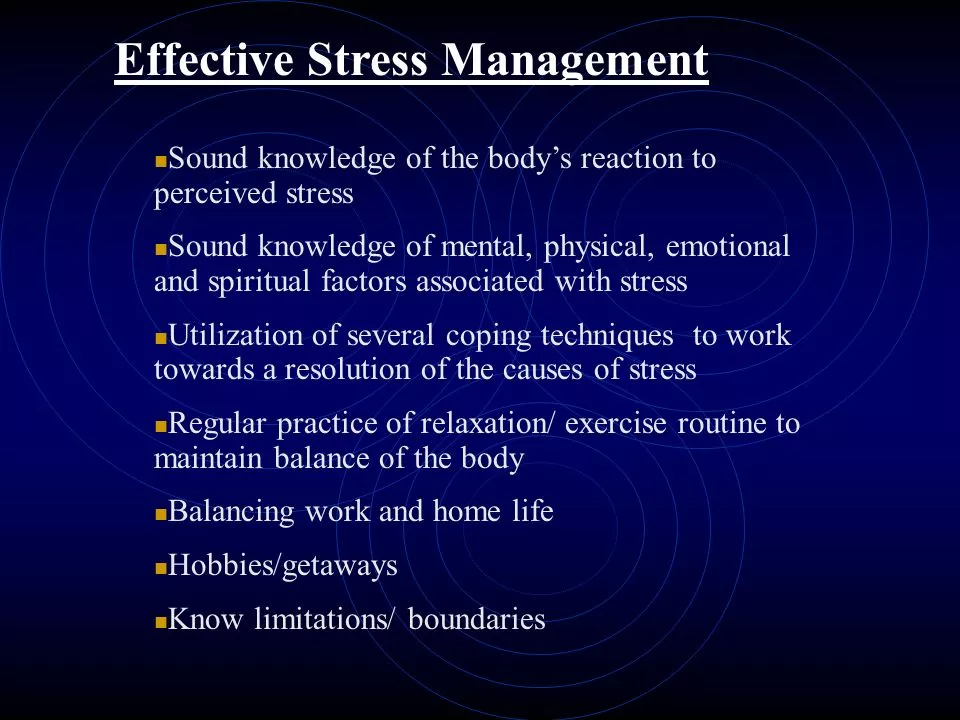Understanding the Connection Between Stress and Stroke
As we all know, stress is a part of everyday life. Whether it's due to work, family, or other personal matters, it's almost impossible to avoid stress altogether. However, it's essential to understand the connection between stress and stroke, as unmanaged stress can increase the risk of having a stroke. When we are stressed, our body releases stress hormones, which can cause an increase in blood pressure and heart rate. Over time, this can lead to damage to our blood vessels and make us more susceptible to a stroke. In this section, we'll explore the science behind this connection and why it's crucial to manage stress for stroke prevention.
Identifying and Managing Your Stress Triggers
To manage stress effectively, the first step is to identify your stress triggers. These could range from work-related issues to personal relationships or financial concerns. Once you have identified the factors that contribute to your stress, it becomes easier to come up with strategies to manage them. For example, if your job is causing you stress, consider talking to your supervisor about your workload or finding ways to delegate tasks. If financial issues are causing stress, consider creating a budget or seeking professional advice. Remember that everyone's stress triggers are different, and it's essential to find personalized solutions that work for you.
Adopting a Healthy Lifestyle for Stroke Prevention
One of the most effective ways to prevent a stroke is by living a healthy lifestyle. This includes eating a balanced diet, exercising regularly, maintaining a healthy weight, and avoiding smoking and excessive alcohol consumption. A healthy diet can help lower blood pressure and cholesterol levels, both of which are risk factors for stroke. Regular exercise has been proven to reduce stress and improve overall cardiovascular health. Additionally, maintaining a healthy weight and avoiding smoking and excessive alcohol consumption can also contribute to reducing your risk of stroke. By adopting a healthy lifestyle, you are not only reducing your stress levels but also actively working towards preventing a stroke.
Practicing Mindfulness and Meditation
Mindfulness and meditation are powerful tools in managing stress and promoting overall well-being. By practicing mindfulness, we can become more aware of our thoughts, emotions, and physical sensations, allowing us to better manage stress and prevent it from affecting our health. Meditation, on the other hand, helps us to quiet our minds and focus on the present moment. Several studies have shown that regular mindfulness and meditation practice can lead to lower stress levels, reduced blood pressure, and improved mental health. By incorporating these practices into your daily routine, you can effectively manage stress and reduce your risk of stroke.
Seeking Social Support
Having a strong support system can play a significant role in managing stress and preventing stroke. When we have people we can talk to about our problems and share our feelings with, it becomes easier to cope with stress. It's essential to maintain healthy relationships with friends, family, and colleagues and seek support when needed. Additionally, joining support groups or participating in community activities can also help build connections with others who share similar experiences, providing a sense of understanding and validation. By seeking social support, you're not only reducing your stress levels but also fostering a sense of belonging and well-being.
Learning to Prioritize and Set Boundaries
One of the most common sources of stress is our inability to prioritize tasks and set boundaries. When we take on too many responsibilities or allow others to take advantage of us, it can lead to overwhelming stress and, eventually, health problems like stroke. To manage stress effectively, it's crucial to learn how to prioritize tasks, delegate responsibilities, and set boundaries with others. By doing so, you can prevent yourself from becoming overwhelmed and ensure that you have time to focus on what truly matters in your life.
Seeking Professional Help If Needed
Lastly, it's essential to recognize when stress becomes too much to handle on your own. If you find that your stress levels are consistently high and affecting your daily life, it may be time to seek professional help. A mental health professional, such as a therapist or psychologist, can provide guidance and support in managing stress and developing healthy coping strategies. Remember, seeking help is not a sign of weakness but rather a proactive step towards improving your mental health and reducing your risk of stroke.



8 Comments
Marcia Facundo
May 1, 2023 AT 02:29I used to think stress was just in my head until I had that panic attack in the grocery store. Now I keep a journal. Not for therapy. Just so I can look back and say, 'Wow, I survived that dumb meeting.'
Alexa Apeli
May 1, 2023 AT 15:01🌟 Mindfulness isn't just a buzzword-it's a lifeline. 🌿 I meditate for 10 minutes every morning before I even check my phone. My blood pressure has dropped 18 points in six months. You deserve peace. 💫
Eileen Choudhury
May 2, 2023 AT 20:05Yesss! I used to be a human stress volcano-spewing rage at traffic, deadlines, even my cat. Then I started dancing in my kitchen like no one’s watching (they are, but who cares?). Now I laugh more, cry less, and my cholesterol’s in the green zone. Life’s too short to be a robot. 💃🕺
Andy Ruff
May 4, 2023 AT 06:59You people are missing the point entirely. This isn't about meditation or dancing in your kitchen-it's about discipline. If you can't control your emotions, you don't deserve good health. I don't have time for 'mindfulness.' I have a 6 a.m. meeting, a 70-hour workweek, and three kids. Stress is just the price of being responsible. If you're weak enough to let stress kill you, you were already on the way out.
Matthew Kwiecinski
May 6, 2023 AT 01:19Actually, the science doesn't support stress as a direct cause of stroke. It's a correlation, not causation. Hypertension, atrial fibrillation, and smoking are the primary risk factors. The article conflates lifestyle factors with stress as if they're interchangeable. You can be a Zen monk and still have a stroke from genetics. This is pseudoscience dressed as wellness.
Justin Vaughan
May 6, 2023 AT 04:30Look, I get why Andy’s mad-he’s probably the guy who’s been working 80 hours since 2019 and still thinks ‘self-care’ is a luxury. But here’s the truth: your body doesn’t care how productive you are. It just knows when it’s being pushed past its limits. I used to be the guy who skipped meals, slept 4 hours, and called it ‘grind culture.’ Then I had a near-miss with a TIA. Now I take walks. I say no. I nap. And I’m still the most productive person in my department. Your worth isn’t measured by how much you suffer. Your health is the only thing you can’t buy back.
Manuel Gonzalez
May 6, 2023 AT 15:49I’ve been reading this thread and I just want to say-thank you. To the person who said stress isn’t real? You’re wrong. To the person who dances in the kitchen? Keep doing it. To the guy who thinks discipline means ignoring your body? You’re not strong-you’re just in denial. I’m a nurse. I’ve seen stroke patients who were CEOs, teachers, grandmas, and teenagers. None of them thought it would happen to them. But it does. And it’s not about being perfect. It’s about showing up for yourself, even when it’s messy.
Brittney Lopez
May 7, 2023 AT 16:16This is so true. I started a weekly coffee chat with coworkers just to talk about anything but work. No advice, no solutions-just ‘how was your week?’ Turns out, half of them were drowning too. We didn’t fix anything. But we stopped feeling alone. Sometimes that’s enough.